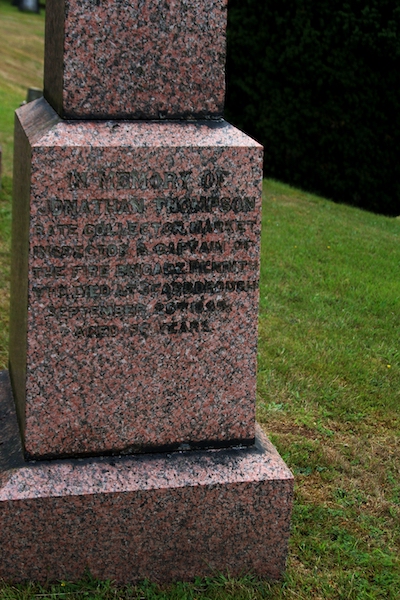Jonathan Thompson wasn’t perhaps not a hero in the sense of brave deeds (though he put himself in danger as a fire fighter). But he was well-regarded by his contemporaries and deserves to be remembered as a Cumbrian Character.
A lasting tribute
Among the thousands of memorial stones at Beacon Edge cemetery, above Penrith, is one in a pinky-red Shap granite. Jonathan Thompson was actually buried in Scarborough, but the memorial was erected in tribute to his years of service to Penrith and the local area – some 118 people had subscribed money for its erection.

at Beacon Edge Cemetery, Penrith
In fact, the memorial fund had raised four times what was needed, with the balance presented to the trustees of Jonathan Thompson’s estate, for his widow and youngest daughter.
So why was Jonathan Thompson held in such high regard? And why, when he died, did the Penrith Observer publish an obituary of no fewer than 974 words? And why did Penrith Ubran Council ‘hurriedly convene’ a meeting specifically because of the news of his death?
Penrith Observer Sept 26, 1899
THOMPSON.—At the George Hotel, Scarborough, on the 20th lnst,, Jonathan Thompson, William Street, Penrith, aged 56 years.—No cards.
Jonathan Thompson had gone to Scarborough for his health, as he was feeling a bit run-down. However, he soon fell ill with typhoid, which proved fatal.
24 years of public service

The Beacon Edge memorial records that Jonathan Thompson had been:
- a captain in Penrith Fire Brigade,
- a rate collector, and:
- a market inspector.
The obituary adds to that:
- inspector of dairies and cowsheds,
- lodging house inspector, and;
- rendered valuable help in the Council’s farming and horse-keeping departments.
And all that after working for several years in the goods warehouse at the Penrith station as a collector.
Jonathan Thompson, early years
Mr Scott, chairman of the Urban Council meeting, said: “It is worthy of note that from comparatively humble circumstances he rose to a position of trust and responsibility.”
However, the census returns all show Jonathan Thompson as having been born in Plumpton. There was only one birth that matches (June 1/4 1843). So it seems highly likely that Jonathan’s background wasn’t so ‘humble’.
1861 Melkinthorpe Farm, Lowther. Jonathan Thompson, 18, farmer’s son, born Plumpton. Father Robert is a farmer of 310 acres.
Ten years later, Jonathan Thompson is working in Penrith, as a railway collector. He is living in Meeting House Lane, working as a railway collector, with wife Jane, 30 and baby Annie, 10 months.
In January 1876, he quit the railways to work for the council. More children followed, and the 1881 census finds him at Sandgate Hall, collector of rates and market inspector, with Jane, Annie, Robert 10, William 5, Henry 3, and Tom, 1. They were living in William Street by 1891, and had been joined by Edith Jane, then six: the ‘youngest daughter’ who benefited from the public subscription when her father died. Son Robert (who was in Scarborough by 1899) wasn’t with them.
Public service
Early in 1876, Jonathan Thompson entered the service of the Local Board. He acted as rate collector, market inspector, lodging house inspector, dairies and cowsheds inspector, and captain of the fire brigade.
‘it was owing in a great measure to is zeal that the brigade was put on such an excellent footing’
Penrith Fire Brigade
Council chairman James Scott led the tributes. Fellow councillor Richard Ballinghall Neville added that:
‘Mr. Thompson was always ready to go out with the fire brigade whenever a call came, no matter what personal risk be might have to run.’
They thought his initial illness may have been a result of his attendance at a stacks fire at Hutton End earlier in September 1899. It had broken out on Lands Foot Farm, occupied by Isaac Bainbridge.
‘Despite some difficulty procuring the horses,’ Captain Jonathan Thompson and others of Penrith Fire Brigade were quickly on the scene. They had to go to a pond half a mile away for water. Then found the hose wouldn’t reach the flames, so had to use buckets. Two stacks (one corn, one hay) were destroyed, and a haystack damaged beyond use. Nine stacks were saved and there was no other damage.
Tributes to Jonathan Thompson
‘He was a good public servant, and… whatever work he took in band was well done.
‘I have no hesitation in saying that a more conscientious, capable, and trustworthy official the town of Penrith never possemed.
‘We do not often find combined in one man the ability to fill different offices with credit…
‘In these varied offices Mr. Thompson was always to be relied upon, and his tact was conspicuous in the not always pleasant duty of rate collecting.’
And another man worthy of mention
Richard Ballinghall Neville was a London-born bank manager who was honorary superintendent of Penrith Fire Brigade. A report in 1903 says:
‘It was largely due to his efforts that they had any fire brigade at all’.
And a year earlier:
‘the town is under numerous obligations to that gentleman in this connection. Mr Neville was instrumental in getting the new steam fire engine, the improved fire station, and the almost complete set of appliances, and by offering prizes to the men of the brigade for drill, he has bought the institution to the position of one of the best equipped and most efficient in the north.

